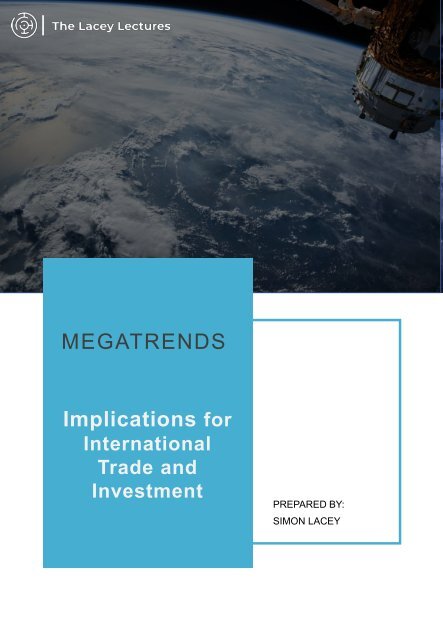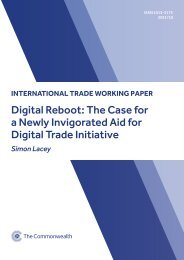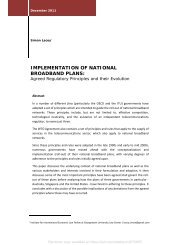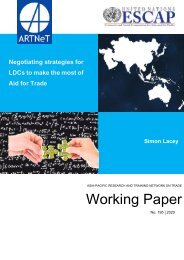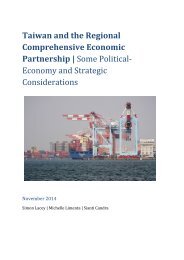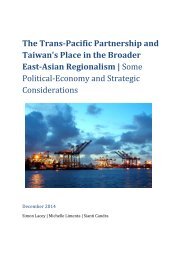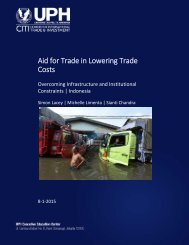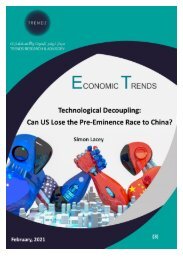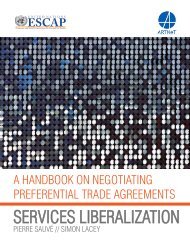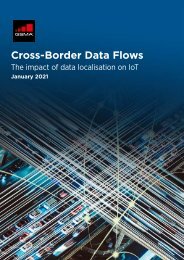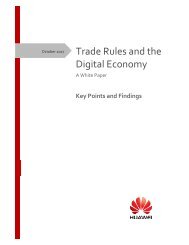Megatrends and Their Implications for International Trade and Investment
This short publication discusses three megatrends, namely 1) geopolitical tensions; 2) known unknowns in the area of technology; and 3) growing inequality, and examines their implications for international trade and investment.
This short publication discusses three megatrends, namely 1) geopolitical tensions; 2) known unknowns in the area of technology; and 3) growing inequality, and examines their implications for international trade and investment.
Create successful ePaper yourself
Turn your PDF publications into a flip-book with our unique Google optimized e-Paper software.
MEGATRENDS<br />
<strong>Implications</strong> <strong>for</strong><br />
<strong>International</strong><br />
<strong>Trade</strong> <strong>and</strong><br />
<strong>Investment</strong><br />
PREPARED BY:<br />
SIMON LACEY
MEGATRENDS 2021<br />
Table of<br />
Contents<br />
Overview<br />
Page 3<br />
Geopolitical<br />
Tensions<br />
Page 4<br />
“Known<br />
Unknowns”<br />
The Pareto<br />
Power Law<br />
Page 5<br />
Page 6<br />
Take-Aways<br />
Page 7
MEGATRENDS 2021<br />
Overview<br />
1<br />
Geopolitical Tensions<br />
Heightened antagonism between<br />
regional <strong>and</strong> geopolitical rivals<br />
2<br />
Known-Unknowns<br />
New technologies but still big<br />
question marks on their impact<br />
3 The Pareto Power Law<br />
Asymmetries between “winners”<br />
<strong>and</strong> “losers” creating societal<br />
tensions<br />
Page 3
MEGATRENDS 2021<br />
Geopolitical Tensions<br />
Geopolitical tensions are here to stay<br />
The geopolitical tensions we are experiencing are not going away anytime soon <strong>and</strong> that will<br />
probably persist over many decades, not just between the US <strong>and</strong> China but also other large<br />
regional powers, particularly India <strong>and</strong> Japan, both of which feel various levels of concern<br />
about a rapidly rising <strong>and</strong> more assertive China on their doorsteps.<br />
Low-intensity/”Grey-Zone” conflict likely to endure<br />
Because with the exception of Japan, these are all nuclear powers, all of these actors have a<br />
strong incentive to avoid escalation <strong>and</strong> thus to keep any tensions simmering at the level of<br />
so-called low-intensity or “grey zone” area conflict, meaning restricted to cyberspace, the<br />
economic <strong>and</strong> monetary sphere <strong>and</strong>/or the battle over who dominates the narrative i.e.<br />
propag<strong>and</strong>a.<br />
Autarky in technology will limit international collaboration<br />
Another important facet of these geopolitical tensions is that the rise in techo-nationalism<br />
<strong>and</strong> thus autarkic strategies in advanced technologies, will likely grow <strong>and</strong>, someone sadly,<br />
will also limit international collaboration <strong>and</strong> thus ultimately, innovation.<br />
Continued international cooperation to trump decoupling<br />
The benefits of international cooperation <strong>and</strong> economic integration over the last seventy<br />
years have been so great <strong>and</strong> that the financial incentives underpinning this trend are still<br />
very much in place, so that these incentives will ultimately trump or at least limit the extent to<br />
which decoupling will be allowed to go.<br />
01<br />
Ramping up of restrictions<br />
on cross border data flows 02<br />
Exp<strong>and</strong>ing restrictions on<br />
strategic components<br />
03<br />
Increased recourse to<br />
national security exception<br />
04<br />
Growing use of investment<br />
screening procedures<br />
Page 4
MEGATRENDS 2021<br />
Known Unknowns<br />
Blockchain technology set to disrupt many fields<br />
Blockchain already starting to be adopted in finance <strong>and</strong> logistics, <strong>and</strong> the number of<br />
potential use cases run into the hundreds, if not thous<strong>and</strong>s. But as yet, the broad-based<br />
adoption of this technology remains elusive, beyond cryptocurrencies.<br />
Quantum computing’s impact still unknown<br />
Likewise quantum computing is another technology rapidly growing in prominence, with<br />
China reputed to have a small lead over the US, but here again, apart from disrupting<br />
encryption of secure communications, it’s not clear what potential this technology will have.<br />
However, most experts concede it will be a real game changer, turning conventional<br />
approaches to computing completely on their heads.<br />
General-purpose AI will be massively disruptive<br />
Advanced AI is another disruptive general purpose technology that is already starting to<br />
have a big impact on the way firms <strong>and</strong> indeed entire economic sectors work, but again, the<br />
full extent of how disruptive this technology will ultimately be is still a matter of speculation<br />
by many experts. The only thing they do agree on is that it will be massive.<br />
LEO economy still waiting <strong>for</strong> widespread adoption<br />
The Low Earth Economy is a key threshold technology that will be absolutely fundamental to<br />
enabling all kinds of low-latency remote wireless technologies, such as autonomous<br />
vehicles, but again, experts disagree as to how quickly this technology will become<br />
ubiquitous <strong>and</strong> how far-reaching its impact will ultimately prove.<br />
01<br />
The real world will continue to stay ahead of the language<br />
in trade agreements<br />
02<br />
Strategic competition <strong>and</strong> governments' ambitions will limit<br />
cooperation <strong>and</strong> integration<br />
03<br />
Firms competing in these spaces will need to be big to<br />
manage regulatory risks<br />
Page 5
MEGATRENDS 2021<br />
The Pareto Power Law<br />
Technology will continue to exude a winner-take-all-dynamic<br />
In the technology space, we can clearly see the emergency of winner take all dynamics,<br />
where the vast majority of the value created in the digital economy is captured by a small<br />
number of big plat<strong>for</strong>ms.<br />
Economic integration will continue to create winners <strong>and</strong> losers<br />
There are glaring problems with the inherently distributive nature of the gains from closer<br />
economic integration, with winners <strong>and</strong> losers suffering vastly different outcomes. Labour<br />
market inertia prevents losers from being able to quickly adapt to the new competitive<br />
environment <strong>and</strong> start becoming winners.<br />
Losers will continue to drive political radicalisation<br />
The losers from globalization quite rightly feel disenfranchised economically <strong>and</strong> have<br />
started to shout the loudest, producing movements <strong>and</strong> seismic political shocks like the<br />
Tea Party, Occupy Wall Street, Brexit <strong>and</strong> the Trump presidency.<br />
Ef<strong>for</strong>ts at closer economic integration will slow or reverse<br />
All of this creates a broad-based backlash that makes it harder <strong>for</strong> political leaders to <strong>for</strong>ge<br />
ahead with closer economic integration, even if the rationale <strong>for</strong> doing so, hasn’t actually<br />
changed: it’s still makes good economic sense to do so. But electorates are less willing to<br />
concede this point today than they have been perhaps at any time in recent history.<br />
01<br />
Shrinking constituency <strong>for</strong><br />
further trade liberalisation<br />
02<br />
Multilateral solutions to big<br />
collective-action problems<br />
become harder<br />
03<br />
The rules-bases system<br />
will become increasingly<br />
the law of the jungle<br />
04<br />
Increasing system<br />
fragmentation to be the<br />
new normal<br />
Page 6
MEGATRENDS 2021<br />
Take-Aways<br />
01<br />
Those who believe in the rules based<br />
order must demonstrate the courage<br />
of their convictions<br />
It’s time to st<strong>and</strong> up <strong>for</strong> the rules, <strong>and</strong> not play favourites on<br />
the basis of such nebulous concepts as “like-minded”<br />
partners or “values-based” economic diplomacy. History<br />
proves that this is just code <strong>for</strong> justifying discriminating<br />
against <strong>and</strong> between trading partners, which the<br />
multilateral trading system was set up to stop.<br />
02<br />
Sticking with or reverting to the status<br />
quo is simply not an option given the<br />
massively disruptive <strong>for</strong>ces at play<br />
Countries, firms <strong>and</strong> individuals need to learn to adapt to a<br />
fast-changing reality, <strong>and</strong> those who can do this, i.e. those<br />
who prove the most agile <strong>and</strong> resilient, are going to be the<br />
most successful.<br />
03<br />
The COVID-19 p<strong>and</strong>emic has been a<br />
big stress-test <strong>for</strong> governments <strong>and</strong><br />
has shown the value of basic<br />
bureaucratic competency<br />
The various phases of the covid-19 p<strong>and</strong>emic to date (i.e. the<br />
initial health crisis of 2020 <strong>and</strong> the logistical <strong>and</strong> other<br />
challenges of the vaccine rollout in 2021) have demonstrated<br />
the value of basic bureaucratic competency. Those countries<br />
that weathered these challenges the best st<strong>and</strong> to make the<br />
biggest gains during <strong>and</strong> after the post-Covid recovery.<br />
Page 7


